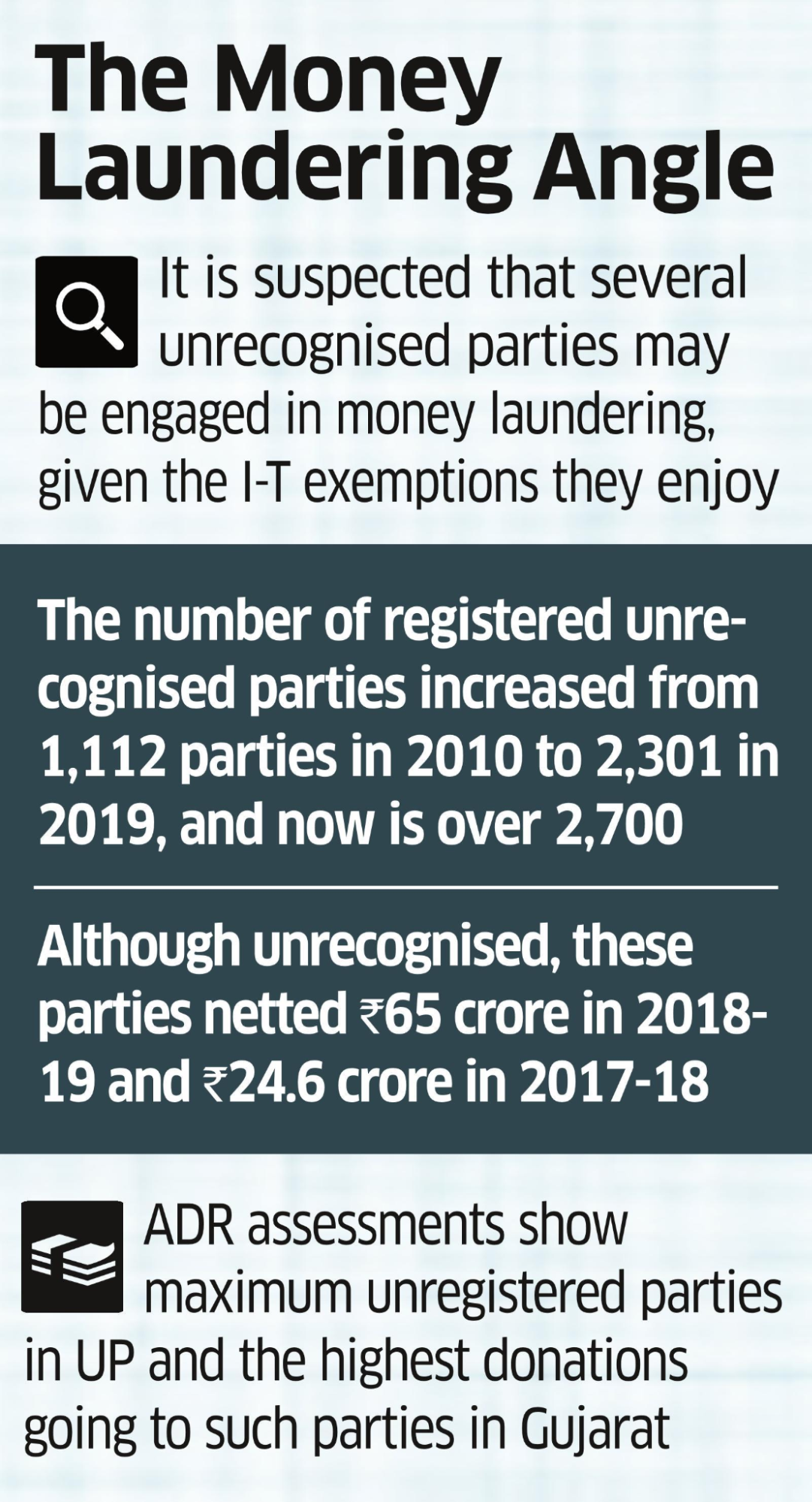Indian Polity
EC Seeks Deregistration of Inactive Political Parties
- 28 Sep 2021
- 6 min read
Why in News
Recently, the Election Commission of India (ECI) has notified the updated list of registered political parties, seeking deregistration of parties which do not contest elections, also it raised concerns over misuse of income tax exemption law.
Key Points
- About:
- There are over two thousands registered unrecognised parties, and the EC has sought the power to deregister (Cancel registration) inactive parties over fears of such entities misusing income tax exemption law.
- ECI also pushes for a wide range of electoral reforms to usher in digitisation, removing duplication of voters and enabling remote voting for Non-Resident Indians (NRIs), even migrant workers within the country.
- Power of Deregistration:
- The ECI is not empowered to de-register parties on the grounds of violating the Constitution or breaching the undertaking given to it at the time of registration.
- ECI has the power to register parties under the Representation of the People Act,(RPA) 1951, but it does not have the power to deregister parties that are inactive.
- A party can only be de-registered if its registration was obtained by fraud; if it is declared illegal by the Central Government; or if a party amends its internal Constitution and notifies the ECI that it can no longer abide by the Indian Constitution.
- Related Concern:
- It is suspected that several unrecognised parties may be engaged in money laundering, given the income tax exemptions they enjoy.
- The Association of Democratic reforms, a watchdog NGO on electoral issues, has reported that the number of registered unrecognised political parties has increased twofold in the last 10 years.
- Section 13A of the Income Tax Act, 1961 has given 100% exemption to political parties on its income from house property, income from other sources, capital gains and voluntary contributions received from any person however, subject to certain conditions.
- It is suspected that several unrecognised parties may be engaged in money laundering, given the income tax exemptions they enjoy.
- Other Challenges for ECI:
- Undefined Scope of Powers:
- There exists a considerable amount of confusion about the extent and nature of the powers which are available to the ECI in enforcing the Model Code of Conduct (MCC) and other decisions related to elections.
- The code does not say what the ECI can do; it contains only guidelines for the candidates, political parties, and the governments.
- No Legal Backing of MCC:
- MCC is framed on the basis of a consensus among political parties, it has not been given any legal backing.
- However, it does not have statutory value, and it is enforced only by the moral and constitutional authority of the EC.
- Transfer of Officials:
- One of the major concerns is the abrupt transfer of senior officials working under State governments by an order of the commission.
- The transfer of officials is governed by rules made under Article 309 of the Constitution which cannot be bypassed by the ECI under the purported exercise of the power conferred by Article 324.
- Conflict With the Law:
- According to the MCC, Ministers cannot announce any financial grants in any form, make any promise of construction of roads, provision of drinking water facilities, etc or make any ad hoc appointments in the government.
- However, section 123 (2)(b) of the RPA, 1951 says that the declaration of a public policy or the exercise of a legal right will not be regarded as interfering with the free exercise of the electoral right.
- Lack of Enforceability:
- The EC does not have the power to disqualify candidates who commit electoral malpractices. At best, it may direct the registration of a case.
- In the 2019 general election, ECI admitted to the Supreme Court that it was “toothless”, and did not have enough powers to deal with inflammatory or divisive speeches in the election campaign.
- The EC does not have the power to disqualify candidates who commit electoral malpractices. At best, it may direct the registration of a case.
- Undefined Scope of Powers:
Way Forward
- The role played by the ECI has bestowed a very high level of confidence in the minds of Indian citizens in ensuring the purity of the elected legislative bodies in the country.
- However, the grey areas in the legal sphere must be rectified, so that ECI can ensure the proper functioning of the democracy via free and fair election.
- It is time that instead of mere rhetoric over independence of the EC some substantial change is brought forward for protection of the constitutional body.
- Additionally, the Commission has to reinvent its approach so that the bedrock of democracy doesn’t shake at its foundations.







